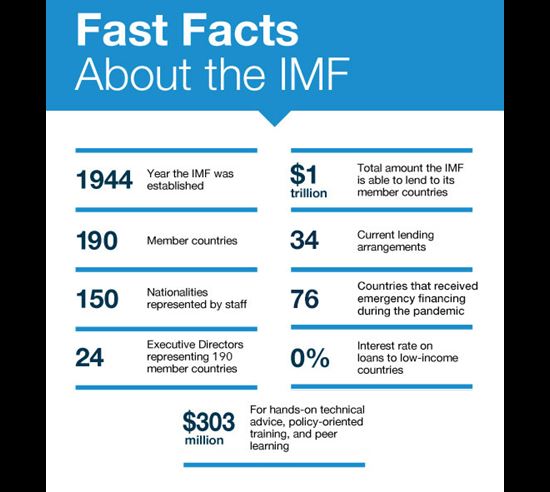Question
In: Accounting
Que1. Describe International Economic Institution. Critically evaluate the role of IMF towards world economy and supporting...
Que1. Describe International Economic Institution. Critically evaluate the role of IMF towards world economy and supporting measures taken by IMF to support various economies of the world during difficult times.
word 600
Solutions
Expert Solution
International Economic Institution
Specific agencies or foundations, both government and private, devoted to collecting or studying economic data, or commissioned with the job of supplying a good or service that is important to the economy of a country. This are in particular institutions that structure trade and financial relationships between countries.
International Monetary Fund
Evaluation of contribution towards world economy
Key IMF activities
- policy advice to governments and central banks based on analysis of economic trends and cross-country experiences;
- research, statistics, forecasts, and analysis based on tracking of global, regional, and individual economies and markets;
- loans to help countries overcome economic difficulties;
- concessional loans to help fight poverty in developing countries; and
- technical assistance and training to help countries improve the management of their economies.
More specifically, the IMF continues to
- provide a forum for cooperation on international monetary problems
- facilitate the growth of international trade, thus promoting job creation, economic growth, and poverty reduction;
- promote exchange rate stability and an open system of international payments; and
- lend countries foreign exchange when needed, on a temporary basis and under adequate safeguards, to help them address balance of payments problems.
Following are the supporting measures taken by IMF to support various economies of the world during difficult times :
- Stepping up crisis lending. The IMF responded quickly to the global economic crisis, with lending commitments reaching a record level of more than US$250 billion in 2010. This figure includes a sharp increase in concessional lending (that’s to say, subsidized lending at rates below those being charged by the market) to the world’s poorest nations.
- Greater lending flexibility. The IMF has overhauled its lending framework to make it better suited to countries’ individual needs. It is also working with other regional institutions to create a broader financial safety net, which could help prevent new crises.
- Providing analysis and advice. The IMF’s monitoring, forecasts, and policy advice, informed by a global perspective and by experience from previous crises, have been in high demand and have been used by the G-20.
- Drawing lessons from the crisis. The IMF is contributing to the ongoing effort to draw lessons from the crisis for policy, regulation, and reform of the global financial architecture.
- Historic reform of governance.The IMF’s member countries also agreed to a significant increase in the voice of dynamic emerging and developing economies in the decision making of the institution, while preserving the voice of the low-income members.
Related Solutions
Discuss the role of the World Bank and IMF in international political economy. Should these institutions...
1. Evaluate the effects of IMF and the World Bank on international trade and their disadvantages....
1. Evaluate the effects of IMF and the World Bank on international trade and their advantages...
Assess the role of the World Health Organization (WHO) and the International Monitory Fund (IMF) in...
Describe the roles of the World Bank (WB), International Monetary Fund (IMF), and World Trade Organization...
the role of international organisation in economic policy in Ghana. your answer must include the IMF...
Briefly discuss the role of the World Bank and International Monetary Fund in the world economy...
Critically evaluate the impacts of COVID- 19 on international trade and the World Trade Organization (WTO)...
Trade is often regarded as an engine of economic growth. Critically evaluate whether international trade...
Describe and explain Agency Theory and its main assumptions, and critically evaluate the role of this...
- What’s the cost of each component of capital and which need to be adjusted? What do...
- Answer the following questions 1) How does ASC 606 — Revenue From Contracts With Customers(new standard...
- Project 7-6: Sales Tax Calculator Create a program that uses a separate module to calculate sales...
- On June 30, Sharper Corporation’s stockholders' equity section of its balance sheet appears as follows before...
- In this journal you are asked to take the role of a mayor or congressional representative...
- Answer correctly the below 25 multiple questions on Software Development Security. Please I will appreciate the...
- 1. The activation energy of a certain reaction is 41.5kJ/mol . At 20 ?C , the...

 ekkarill92 answered 3 years ago
ekkarill92 answered 3 years ago